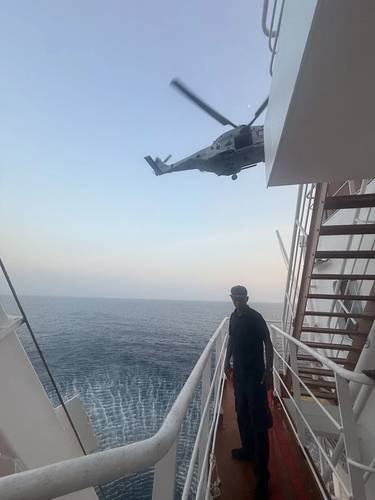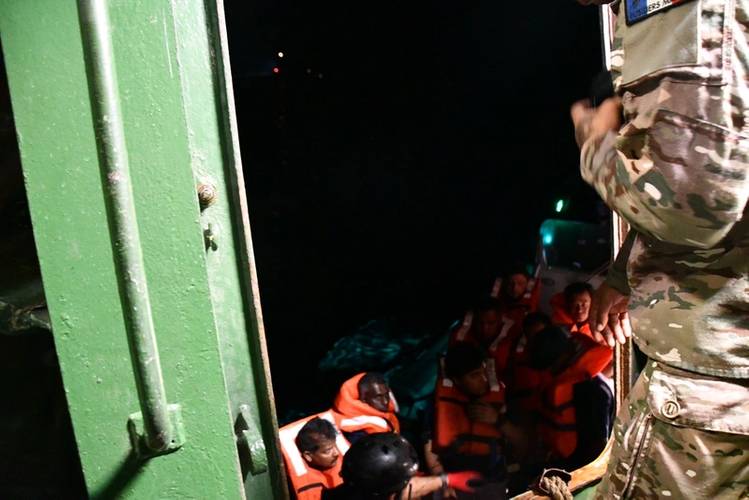Crew Safe as Dutch-Flagged Cargo Ship Remains Adrift and Ablaze in Gulf of Aden
The Dutch-flagged cargo ship Minervagracht was ablaze and adrift in the Gulf of Aden on Tuesday, a day after being hit by an explosive device, its operator and the EU maritime mission Aspides said.
Yemen's Houthi militants claimed responsibility on Wednesday for the attack, saying it was carried out by a cruise missile.
The strike injured two sailors and forced a helicopter evacuation of the ship's 19 crew members, according to the EU maritime mission Aspides and the vessel's operator.
Amsterdam-based operator Spliethoff said on Monday Minervagracht was in international waters in the Gulf of Aden when it was hit, suffering substantial damage and a fire.
"Minervagracht has sustained considerable damage," the company said in a statement, adding that all the crew had been safely evacuated and that it was working with international authorities and experts to salvage the vessel.
Most of the crew, including one of the injured seafarers who is in a stable condition, were transferred to a Greek and a French frigate, naval mission Aspides said on Tuesday.
Another crew member, who was seriously wounded, was evacuated by helicopter and they have all arrived in Djibouti.
The Houthis said they attacked Minervagracht because its owner violated "the entry ban to the ports of occupied Palestine".
It was the first Houthi attack on a commercial ship since September 1, when they targeted Israeli-owned tanker Scarlet Ray near Saudi Arabia's Red Sea port city of Yanbu.
In July, the Houthis attacked and sank the Magic Seas bulk carrier and Eternity C cargo ship in the Red Sea.
The last significant Houthi attack in the Gulf of Aden was on the Singapore-flagged Lobivia container ship in July 2024.
Houthis Sanction 13 U.S. Oil Firms
The Houthis will target U.S. oil majors including ExxonMobil and Chevron with sanctions, a body affiliated with the militia said on Tuesday.
The Sanaa-based Humanitarian Operations Coordination Center (HOCC), a body set up last year to liaise between Houthi forces and commercial shipping operators, sanctioned 13 U.S. companies, nine executives and two vessels, HOCC said.
The sanctions are in retaliation for U.S. sanctions imposed on the Houthis this year despite a truce agreement with the Trump administration in which the Yemeni group agreed to stop attacking U.S.-linked ships in the Red Sea and the wider Gulf of Aden, HOCC said.
Exxon declined comment and Chevron did not immediately comment.
"It remains unclear whether these sanctions signal that the Houthis will begin targeting vessels linked to the sanctioned organizations, companies, and individuals — a move that would risk violating the ceasefire agreement with the Trump administration, facilitated by Oman," independent Middle East analyst Mohammed Albasha said in a LinkedIn post on Tuesday.
Last year, the U.S. imported about 500,000 barrels per day of crude and condensate from Gulf countries through the Strait of Hormuz, according to the EIA. That represents about 7% of total U.S. crude oil and condensate imports - the lowest level in nearly 40 years due to increased domestic production and Canadian imports, the agency said.
Albasha, founder of U.S.-based Risk Advisory Basha Report, told Reuters the move is unlikely to affect the oil market, since most of the trade in the region is handled by Chinese, Russian, Iranian, and other Gulf companies that the Houthis want to keep on good terms with.
"This looks like a media stunt, a way to save face and reassure their people in light of mounting U.S. sanctions and Israeli strikes that have been hurting their economy," he said.
To that end, the HOCC statement also included this line: "The ultimate goal of the sanctions is not punishment in itself, but to bring about positive behavioral change."
(Reuters)






















